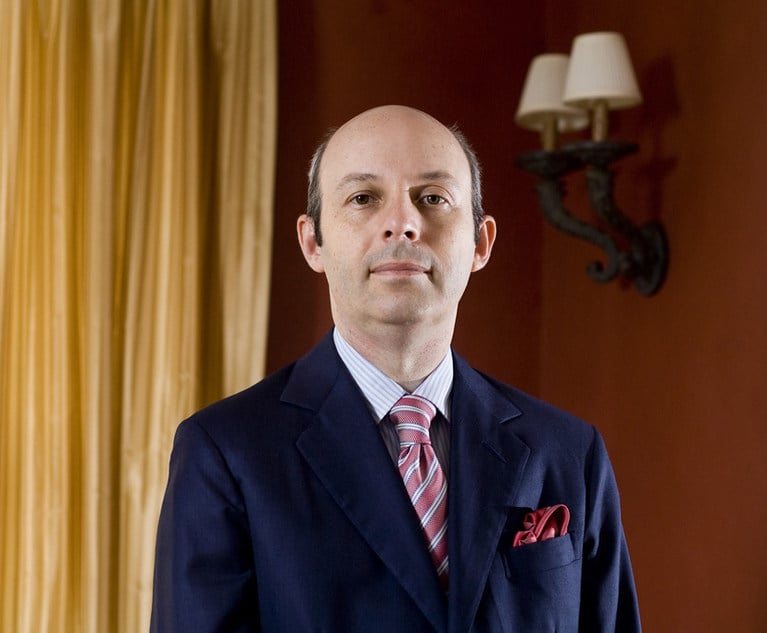Cosby Prosecutor Kristen Gibbons Feden on Securing a Verdict
"I'm always of the strong belief that our case rose and fell with Andrea Constand," Feden says. "Her testimony at the first trial and at the second trial was … unwavering."
May 25, 2018 at 12:00 PM
7 minute read
 Kristen Gibbons Feden of Stradley Ronon Stevens & Young, LLP in Philadelphia, PA. May 1, 2018. Photo: Carmen Natale/ALM
Kristen Gibbons Feden of Stradley Ronon Stevens & Young, LLP in Philadelphia, PA. May 1, 2018. Photo: Carmen Natale/ALM
Kristen Gibbons Feden says Bill Cosby's image as America's dad, a popular comedian and philanthropist was crucial in his scheme of drugging and sexually assaulting women, including Andrea Constand. Constand's allegations from 2004 led to criminal charges—and a guilty verdict on three counts of aggravated indecent assault—in Cosby's retrial before a Montgomery County, Pennsylvania, jury on April 26.
Feden, who shared the closing argument in the retrial with Assistant District Attorney M. Stewart Ryan, was part of a team of prosecutors that worked on the Cosby case, beginning when then-District Attorney Risa Vetri Ferman, now a Montgomery County judge, reopened the case in 2015. Working with Montgomery County District Attorney Kevin Steele and Ryan, Feden saw the case through even after going into private practice at Philadelphia-based Stradley Ronon Stevens & Young—taking a leave from the firm to serve as a special prosecutor on the retrial.
As of press time in early May, Cosby, whose first trial ended in a mistrial in June 2017, has yet to be sentenced. He faces up to 10 years in jail for each count. His lawyers have vowed to appeal, and his wife, Camille Cosby, has publicly called for the prosecution to be investigated. (The Montgomery County District Attorney's Office declined to respond to her allegations.)
The National Law Journal spoke with Feden, who says the verdict has sent a message to the citizens of Montgomery County, and, she hopes, to all victims of crime. The conversation below was edited for length and clarity.
National Law Journal: In your closing argument at the retrial, you came down hard on the defense for character assassination against Bill Cosby's accusers. Will this case change how alleged victims are viewed?
Kristen Gibbons Feden: It's important to note that this was one case, one crime against one victim. But what I can say is my hope for the future is that on a smaller scale it shows the citizens of Montgomery County that the district attorney will look at the evidence and prosecute the case, as long as they have the evidence to prove that crime beyond a reasonable doubt, without concern for the power and wealth of the defendant. And I think that's a really important message to put forth.
For more of a national message, my hope for the future is that victims of crime feel comfortable coming forward with the knowledge that these are rape myths, and that a higher level of education is put on law enforcement or kids or society as a whole, and that message is ongoing.
NLJ: District Attorney Steele said you were adamant about bringing charges against Bill Cosby in 2015. Why was that?
Feden: I was one of the first prosecutors to go out and meet Andrea Constand and I was one of the first people to not only meet her but review the entirety of the deposition. I also looked at all of the other evidence. I felt that [charging Cosby] was the right thing to do. If you follow the evidence and you believe you can prove the elements of any charge beyond a reasonable doubt I felt as a prosecutor it's your duty to prosecute that case.
NLJ: What did you learn from the first trial?
Feden: What I learned from the first trial to the second trial is how important the [Section] 5920 victimologist really is, and how powerful that person's testimony, knowledge and education to the jury really is. [This statute allows testimony from an expert witness on the behaviors or responses of victims after a sexual assault.] I really think one of the most powerful things was … putting Dr. [Barbara] Ziv on first to educate the jury, so when the character assassination came, they were educated to know those are rape myths that are generally held, but not necessarily true.
NLJ: At the retrial, do you think the prosecution was able to put on a stronger case?
Feden: To be honest, no. I'm always of the strong belief that our case rose and fell with Andrea Constand. Her testimony at the first trial and at the second trial was … unwavering. Yeah, we got some additional evidence to present to the jury and that's always powerful, but we put on the same case we did the first time.
NLJ: How did going against a different defense team at retrial factor into your strategy?
Feden: I was very nervous because you had a transcript of the first trial. They knew what we were going to do. So it was a difficult challenge for me to try to put on the same exact case, but do it in a different way so I could try to catch them off-guard if I could.
I wouldn't have done my due diligence if I didn't look them up so I could try to anticipate what kind of defense or what kind of strategy or what type of personality they were going to bring to the trial. And the main reason I like to do that type of research is not necessarily to help me in the courtroom—because I kind of am what I am—but to best prepare my victims and witnesses.
You have to let them be prepared: This is what they're going to try to do to your reputation. This is the kind of assassination you can expect. Are you OK with that? What can I do to make it a little more comfortable?
NLJ: What was your reaction to the guilty verdict?
Feden: For the jury to come back and say “guilty, guilty, guilty,” the only thing I could think about was how proud of Andrea I was that she was able to withstand that level of scrutiny not once but twice. She was able to stand up to her offender. That's the type of happiness I get with any guilty verdict.
NLJ: How did Cosby's celebrity and reputation factor into your thoughts during the case?
Feden: It's an important message to the jury that this was exactly what he used to gain the confidence and trust of all of these unsuspecting women. A lot of people victim-shame and blame the victim, but it's important to note that that's the exact tool he used to lure them there. I thought it was on the forefront of everyone's mind, that he's a good person, but I needed them to know that was part of it.
NLJ: Will we see more criminal prosecutions against high-profile people accused of sexual misconduct?
Feden: I don't know. I like to believe that every prosecutor will look at the evidence, follow the evidence and make the right decision regardless of the level of scrutiny.
While saying that, I do think it's important to highlight the courage and bravery that Risa Ferman showed and Kevin Steele showed to retry the case, and Risa to initiate charges. I hope that [to] all the people in law school who will be our future DAs, our future prosecutors … I hope that sends a message that [victims] are comfortable coming forward and they're comfortable advocating for change and they're comfortable standing up for what they believe in.
This content has been archived. It is available through our partners, LexisNexis® and Bloomberg Law.
To view this content, please continue to their sites.
Not a Lexis Subscriber?
Subscribe Now
Not a Bloomberg Law Subscriber?
Subscribe Now
NOT FOR REPRINT
© 2025 ALM Global, LLC, All Rights Reserved. Request academic re-use from www.copyright.com. All other uses, submit a request to [email protected]. For more information visit Asset & Logo Licensing.
You Might Like
View All
‘Undermines the Rule of Law’: Retired US Judges Condemn Trump’s Jan. 6 Pardons

US Judge Cannon Blocks DOJ From Releasing Final Report in Trump Documents Probe
3 minute read
SCOTUSblog Co-Founder Tom Goldstein Misused Law Firm Funds, According to Federal Indictment
2 minute read
Read the Document: DOJ Releases Ex-Special Counsel's Report Explaining Trump Prosecutions
3 minute readTrending Stories
Who Got The Work
J. Brugh Lower of Gibbons has entered an appearance for industrial equipment supplier Devco Corporation in a pending trademark infringement lawsuit. The suit, accusing the defendant of selling knock-off Graco products, was filed Dec. 18 in New Jersey District Court by Rivkin Radler on behalf of Graco Inc. and Graco Minnesota. The case, assigned to U.S. District Judge Zahid N. Quraishi, is 3:24-cv-11294, Graco Inc. et al v. Devco Corporation.
Who Got The Work
Rebecca Maller-Stein and Kent A. Yalowitz of Arnold & Porter Kaye Scholer have entered their appearances for Hanaco Venture Capital and its executives, Lior Prosor and David Frankel, in a pending securities lawsuit. The action, filed on Dec. 24 in New York Southern District Court by Zell, Aron & Co. on behalf of Goldeneye Advisors, accuses the defendants of negligently and fraudulently managing the plaintiff's $1 million investment. The case, assigned to U.S. District Judge Vernon S. Broderick, is 1:24-cv-09918, Goldeneye Advisors, LLC v. Hanaco Venture Capital, Ltd. et al.
Who Got The Work
Attorneys from A&O Shearman has stepped in as defense counsel for Toronto-Dominion Bank and other defendants in a pending securities class action. The suit, filed Dec. 11 in New York Southern District Court by Bleichmar Fonti & Auld, accuses the defendants of concealing the bank's 'pervasive' deficiencies in regards to its compliance with the Bank Secrecy Act and the quality of its anti-money laundering controls. The case, assigned to U.S. District Judge Arun Subramanian, is 1:24-cv-09445, Gonzalez v. The Toronto-Dominion Bank et al.
Who Got The Work
Crown Castle International, a Pennsylvania company providing shared communications infrastructure, has turned to Luke D. Wolf of Gordon Rees Scully Mansukhani to fend off a pending breach-of-contract lawsuit. The court action, filed Nov. 25 in Michigan Eastern District Court by Hooper Hathaway PC on behalf of The Town Residences LLC, accuses Crown Castle of failing to transfer approximately $30,000 in utility payments from T-Mobile in breach of a roof-top lease and assignment agreement. The case, assigned to U.S. District Judge Susan K. Declercq, is 2:24-cv-13131, The Town Residences LLC v. T-Mobile US, Inc. et al.
Who Got The Work
Wilfred P. Coronato and Daniel M. Schwartz of McCarter & English have stepped in as defense counsel to Electrolux Home Products Inc. in a pending product liability lawsuit. The court action, filed Nov. 26 in New York Eastern District Court by Poulos Lopiccolo PC and Nagel Rice LLP on behalf of David Stern, alleges that the defendant's refrigerators’ drawers and shelving repeatedly break and fall apart within months after purchase. The case, assigned to U.S. District Judge Joan M. Azrack, is 2:24-cv-08204, Stern v. Electrolux Home Products, Inc.
Featured Firms
Law Offices of Gary Martin Hays & Associates, P.C.
(470) 294-1674
Law Offices of Mark E. Salomone
(857) 444-6468
Smith & Hassler
(713) 739-1250








